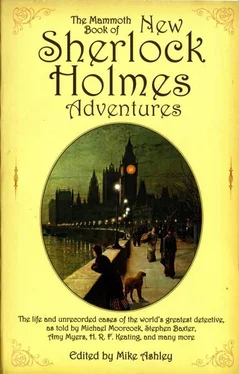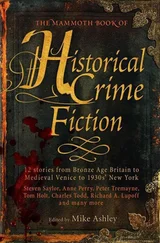Mike Ashley - The Mammoth Book of New Sherlock Holmes Adventures
Здесь есть возможность читать онлайн «Mike Ashley - The Mammoth Book of New Sherlock Holmes Adventures» весь текст электронной книги совершенно бесплатно (целиком полную версию без сокращений). В некоторых случаях можно слушать аудио, скачать через торрент в формате fb2 и присутствует краткое содержание. Жанр: Детектив, на английском языке. Описание произведения, (предисловие) а так же отзывы посетителей доступны на портале библиотеки ЛибКат.
- Название:The Mammoth Book of New Sherlock Holmes Adventures
- Автор:
- Жанр:
- Год:неизвестен
- ISBN:нет данных
- Рейтинг книги:5 / 5. Голосов: 1
-
Избранное:Добавить в избранное
- Отзывы:
-
Ваша оценка:
- 100
- 1
- 2
- 3
- 4
- 5
The Mammoth Book of New Sherlock Holmes Adventures: краткое содержание, описание и аннотация
Предлагаем к чтению аннотацию, описание, краткое содержание или предисловие (зависит от того, что написал сам автор книги «The Mammoth Book of New Sherlock Holmes Adventures»). Если вы не нашли необходимую информацию о книге — напишите в комментариях, мы постараемся отыскать её.
Marianne is an important fictional formulation of Sand's thinking on the role of women and the nature of democracy. This edition includes a long biographical preface which quotes extensively from her correspondences.
The Mammoth Book of New Sherlock Holmes Adventures — читать онлайн бесплатно полную книгу (весь текст) целиком
Ниже представлен текст книги, разбитый по страницам. Система сохранения места последней прочитанной страницы, позволяет с удобством читать онлайн бесплатно книгу «The Mammoth Book of New Sherlock Holmes Adventures», без необходимости каждый раз заново искать на чём Вы остановились. Поставьте закладку, и сможете в любой момент перейти на страницу, на которой закончили чтение.
Интервал:
Закладка:
"Excellent idea, young man. Play the part of Chorus and leak your spines clearly."
Holmes began his explanation, hurrying on when his audience showed signs of wishing to question or interrupt. "First, I must suggest to you that your reading of Dr Giddings's character owes more to charity than objective observation. I fear that the senior fellow was furious at being passed over for the wardenship and that that is why he gave his painting to New College."
"But, surely…"
Holmes scarcely paused for breath. "It was to be his revenge. You see, the painting was a fake, or more probably the work of an inferior artist touched up by the hand of an improver. I realized this when I spoke with Mr Simkins. He was puzzled because the painting which another of his clients had seen about the time Giddings bought it was "vibrant" with "warm, glowing colours" as he described it. Yet when Simkins, himself, viewed it in the chapel it was apparently obscured with ancient varnish. Now Giddings was the only one who could so have misused the picture and for only one reason: he realized, after adding it to his collection that it was not a work from the hand of the master. To avoid the humiliation of having to admit that he had been duped he had the picture varnished over, and waited for an opportunity to get rid of it. His exclusion from the wardenship provided the excellent chance to kill two birds with one stone. He disembarrassed himself of the fake Rembrandt and put one over on the fellows of New College. Giddings knew that, eventually, the painting would be cleaned and that, from beyond the grave, he would have his revenge.
"Then, long after the whole matter had been pushed to the back of his mind, he was alarmed to hear that the fellows had decided upon the immediate restoration of their Rembrandt. He knew Simkins and Streeter could not fail to discover the truth and that both his folly and his vendetta would be exposed.
What could he possibly do to prevent the closing days of his life being lived under this double shame? Only the disappearance of the picture could save him but he could not encompass that. He would need accomplices. It was then that he bethought himself of his friend and fellow collector, Lord Henley."
"Lord Henley? Why on earth should that highly respected nobleman be a party to such a notorious escapade?"
"I confess that I, too, was puzzled on that score. Eventually I had to prize the truth from his son, Mr Mountcey."
"That young man is a scoundrel."
"Quite so, sir." Holmes rushed on. "It seems that not only did the two collectors share common interests, but Lord Henley owed a considerable debt of gratitude to Dr Giddings. A few years ago a crooked dealer attempted to implicate his lordship in a colossal art fraud. Had he been successful the scandal would have been terrible. Giddings was largely responsible for exposing the syndicate behind the imposture. Lord Henley now felt duty bound to assist his saviour. The two old friends planned the robbery together. Giddings found out through his college contacts the precise day on which Simkins and Streeter were to collect the painting. Then Lord Henley arranged for the fake telegram postponing the appointment and had one of his underworld contacts pose as the restorers' agent. Just in case anyone from the college who watched the removal became suspicious he arranged for the work to be done under cover of darkness when the chapel was almost certain to be empty."
"But what about the other thefts?"
"A fortuitous sequence of events that enabled the conspirators to muddy the water. Lord Henley's son was involved in a rather stupid society the object of which was to plan and execute ever more audacious "japes", as they call them. The Oriel and Merton escapades were carried out by other members of the club and it was Mountcey and his friends who defaced the walls of Magdalen by removing the sundial. It seems that Lord Henley knew of these ridiculous revels and, being an over-indulgent parent, was not disposed to regard them seriously. It was he who put his son up to the fracas that took place early in the term. When Mountcey and his friends were caught examining the chapel painting the authorities connected this with the earlier misdemeanours, a suspicion that was reinforced when
the picture went missing. Of course, Mountcey could not be proved to be implicated in the theft, so he was quite safe."
Spooner was frowning with concentration. "But, then, whose incunabulum stole the Radcliffe?"
"I am persuaded that it was Giddings himself who removed the book from the library. Mountcey gave me his word that he knew nothing of it. Such a reputed and infirm scholar as Dr Giddings was, of course, above suspicion, so it was the easiest thing in the world for him to leave with the precious artefact under the rug in his bath chair, having left the duplicate."
"Then the book and the painting are safe in Dr Giddings's house?"
"The book – yes. I am sure Dr Giddings would not harm it, nor intend to deprive the library of it for long. The painting, I suspect, is another matter." Holmes opened a portmanteau he had brought with him. He extracted a parcel roughly wrapped in newspaper and proceeded to unravel it.
Spooner leant forward to examine a blackened fragment of what had once been gilded wood and gesso and to which a fragment of charred canvas still adhered.
"The night before last," Holmes explained, "I paid a clandestine visit to Dr Giddings's garden. I found this on a bonfire in a corner of the grounds. The embers were still warm. Unless I am mistaken, that is all that remains of the fake Rembrandt – and just as well, perhaps."
"Whatever made you think of looking there?"
"When I called on Dr Giddings the previous day, he was obviously concerned about my interest in the Rembrandt. He tried to convince me that its theft was a student prank and he brought my visit to a sudden halt with what seemed to me rather a theatrical fit of coughing. I believe that was to prevent me looking inside the room where the painting was currently housed. I reasoned that he would want to be rid of the evidence very quickly after such a fright and there seemed to be only one easy way to do that."
Spooner removed his spectacles and polished them thoughtfully. "Mr Holmes," he said, "you are a remarkable young man. I predict that you will go far. May I ask you to put what you have just told me in writing? My colleagues will, I know, want to study it most carefully."
"I had anticipated that request," replied my friend, handing over a sealed envelope.
"How wise, Mr Solomon, how wise. The college is indebted to you. You will undoubtedly be hearing more from us. For the moment all I can do is personally grace my platitude on record." He shook Holmes warmly by the hand and escorted him to the door.
Sherlock Holmes reflected during the next few days on the immense pleasure and satisfaction this little enquiry
had occasioned him. He had, at that time, no inkling that his vocation lay in the field of criminal detection but, as he later confessed to me, the bothersome business of the Dutch Nativity, was undoubtedly the case that opened up new possibilities to him.
All that lay in the future. One more immediate result manifested itself a few days later. Holmes received an unexpected
invitation to dine with the Master of Grenville. He arrived at the
lodge at the appointed time expecting to find himself one of a large party. To his surprise the only other guest was the Warden
of New College. As soon as the three men had embarked on
their meal the master introduced the subject of Holmes's recent investigations. The fellows of New College were very grateful
to him for clearing the matter up but were anxious that none of the information he had gathered should go any further. Under the circumstances he felt sure that Holmes would appreciate that absolute secrecy must be a condition of his remaining in Oxford.
Читать дальшеИнтервал:
Закладка:
Похожие книги на «The Mammoth Book of New Sherlock Holmes Adventures»
Представляем Вашему вниманию похожие книги на «The Mammoth Book of New Sherlock Holmes Adventures» списком для выбора. Мы отобрали схожую по названию и смыслу литературу в надежде предоставить читателям больше вариантов отыскать новые, интересные, ещё непрочитанные произведения.
Обсуждение, отзывы о книге «The Mammoth Book of New Sherlock Holmes Adventures» и просто собственные мнения читателей. Оставьте ваши комментарии, напишите, что Вы думаете о произведении, его смысле или главных героях. Укажите что конкретно понравилось, а что нет, и почему Вы так считаете.












